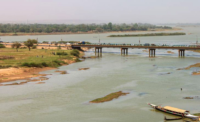Private investment in developing countries’ energy, transportation and water infrastructure tumbled 53% in the first half of 2015, to $25.3 billion, largely because of a sharp drop in the number of projects in Brazil, China and India, a new World Bank report says.
In the report, released on Dec. 15, the bank said commitments in Brazil plunged by 94%, to only $1.8 billion from $30.9 billion, in January-June 2014. China had just 11 infrastructure transactions during the period valued at $328.4 million. It was the country’s fewest projects since 1995.
But bank officials also highlighted strength in renewable energy, which accounted for $12.4 billion in investment in the January-June period, or 49% of the total—its highest share ever.
The report noted that South Africa closed deals for 16 renewable energy projects, valued at $4 billion, in the period. Chile, Morocco, Pakistan, Jordan and Brazil combined for 26 renewable projects, valued at $5.3 billion.
Clive Harris, the World Bank Group’s practice manager for public-private partnerships, said in a statement that solar projects accounted for more than one-third of the $16.3 billion in energy investment, compared with just 6% for coal-powered projects.
Energy-project volume was the largest of the three sectors in 2015’s first half, followed by transportation, at $8.1 billion, and water, with $884.1 million. But investment was down significantly in all three categories.
Electricity generation and transmission was the energy market’s largest segment, with $14.8 billion in projects. Road projects topped the transportation category, at $5.3 billion, and water-utilities projects led the water category, at $748.5 million, according to the report.
The bank also reported that the total number of projects declined slightly, to 124 from the year-earlier 132, and the average size of infrastructure deals also fell by more than 50%, to $205 million. Officials noted that there were few megaprojects and many relatively small renewable-energy projects in the first half.
The reduced project size is a shift from a 10-year trend of annual increases, the bank said.
Still, there were a few megaproject deals during the first half. The largest was the $1.5-billion second phase of the Los Ramones gas pipeline in Mexico, which is 25% owned by Sempra Energy International, San Diego.
Ranking second was the $1.1-billion domestic terminal at Turkey’s Dalaman Airport, 100% owned by that country’s YDA. The third-largest was the $1-billion NOORo II solar-energy project in Morocco, 70% owned by Riyadh-based ACWA Power.


